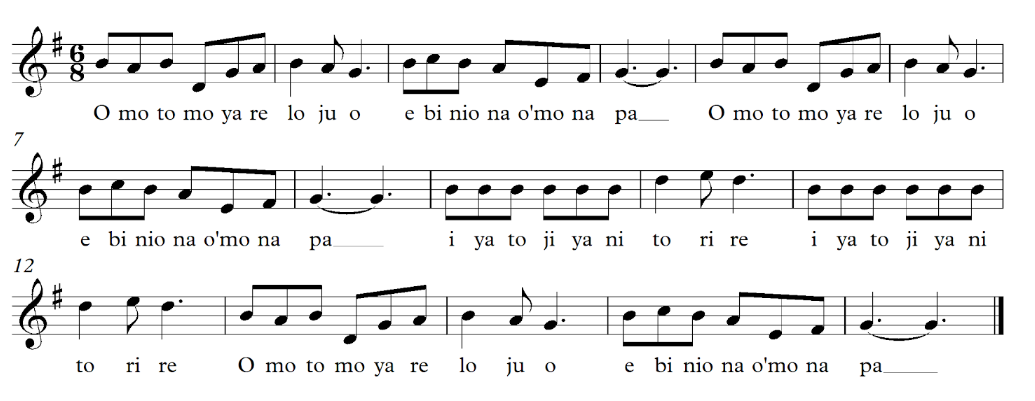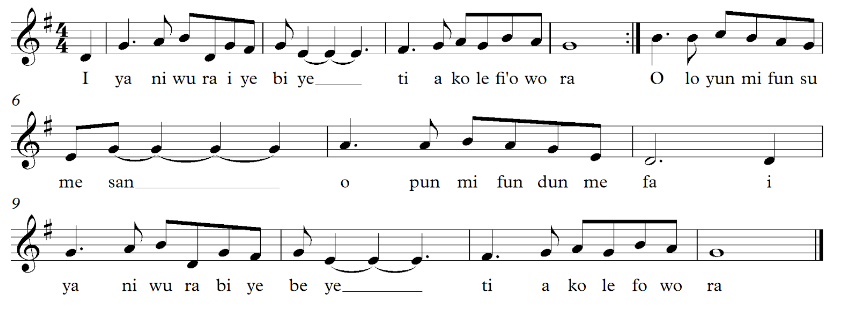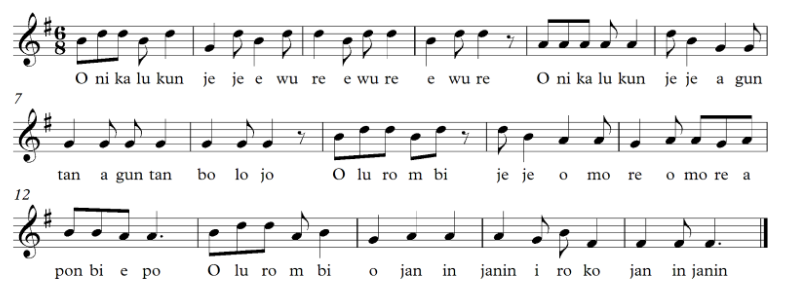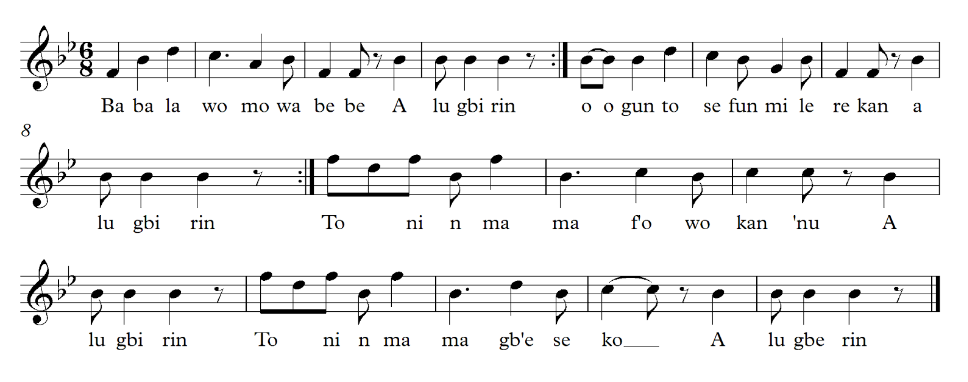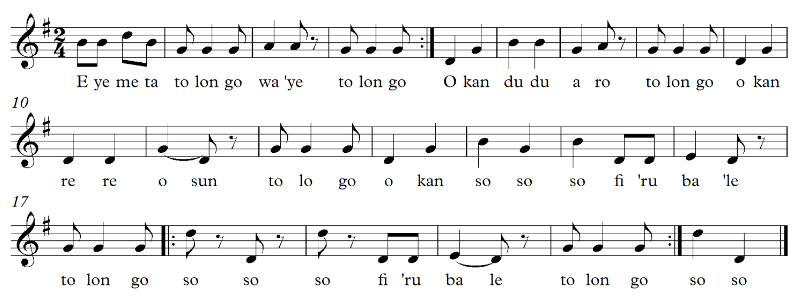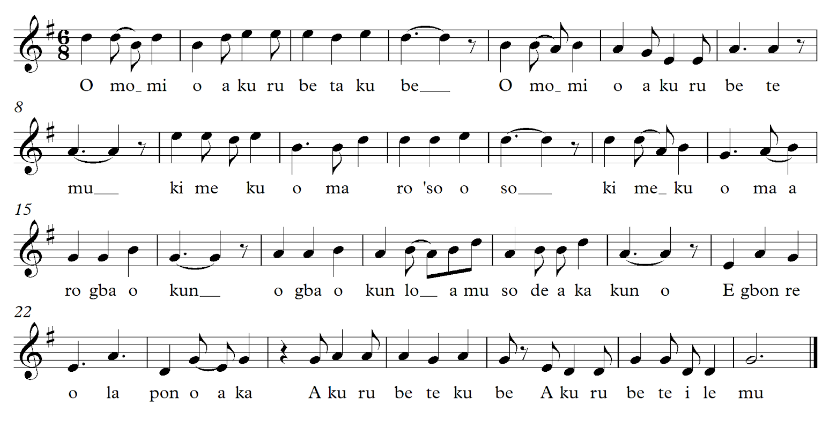UDC: 784.4(669.1)
781.7(=423)
COBISS.SR-ID 109614089
_________________
Received: Dec 24, 2022
Reviewed: Jan 15, 2023
Accepted: Jan 20, 2023
Folk Songs as an Agent of Cultural Transmission,
Teaching and Learning for a Yoruba Child
Ikumapayi Abayomi Ayoola
Department of Theater Arts and Music, Lagos State University
[email protected]
Department of Theater Arts and Music, Lagos State University
[email protected]
|
Citation: Ayoola, A. Ikumapayi. 2023. "Folk Songs as an Agent of Cultural Transmission, Teaching and Learning for a Yoruba Child." Accelerando: Belgrade Journal of Music and Dance 8:4
|
Abstract
This study explores the origin, as well as the development and changes that might have occurred in the folk music in the course of time, and to transcribe African music materials into educational materials for school use. Significantly, the objective is to document the identified function and the performance practice, which would give insight into the performance of the music. It also documents and archives musical folk songs for educational purposes, in order to reveal its socio-cultural values within the context in which it is performed. The research design used was historical research method, library search to consult relevant scholarly works, newspapers, theses, books and journals, electronic sources such as the video clip, tape recording and internet were examined, and they provided additional information for the study. The study identifies and provides musical notation of Yoruba folk songs materials that can be interpreted globally in the world of music, and also examines the influence and efficacy of Yoruba folk songs in ways of teaching that would be geared towards supporting learning, inculcating moral standards and cultural transmission. The findings revealed that folk songs constitute a dynamic forum through which members of a society respond and adapt to the culture of the society. It therefore recommends that contemporary government should provide better funding to ensure preservation of such cultural institutions and heritage.
Keywords: folk songs, transmission, culture, teaching and learning |
Introduction
Music is a significant element in every culture, and virtually all activities of man need one form of music or another. It is one of the strongest tools for cultural uniqueness and self-identity. Music plays the role of an agent of culture, preserving, sustaining and regulating the various institutions. It reveals a great deal about social norms, habits and ways of life of Africans. Ekwueme (1997) (cited in Adesokan 2009) states that music as part of general education transmits the cultural heritage of people. Through musical activities and experiences, members acquire knowledge, skills, attitudes and appreciation of their customs, norms, and aesthetic values. It is almost impossible to talk about a given society without reference to their music. Music has always been an integral part of Nigerian culture. According to Okafor:
<...> no study of culture is complete without a close and corresponding study of the music of the people. It is impossible to know enough of other people on other lands, without a corresponding study of their music”. (Okafor 1986)
Through music, the traditional society controls groups, individuals, and sections within the society. Mbanugo (1990) specified that music controls and regulates social behavior in each ethnic group in Nigeria, by providing either direct warnings to erring members, or by directly indicating what is considered proper behavior to members of the society.
Music is performed in connection with aspects of ethnic life, such as coronations, calendar festival, initiation ceremonies, installation, birth, coronation and other social events. Music is one of the strongest tools for cultural uniqueness and self-identity in the life of any society. It serves as a vehicle for transmitting and perpetuating cultures. Music plays a significant role in educating, admonishing, encouraging, and enlightening the members of the society for purposeful and peaceful societal development. The music portrays the way of life of the individuals within the community. Music is an expression of the culture of the people, that is the costumes, values, traditional musical instruments, and their language. In traditional Nigerian societies, music is conceived as an object of aesthetic contemplation, as well as a socio-cultural phenomenon whose importance transcends musical values. Accordingly, music constitutes an important educational forum through which members of the traditional Nigerian societies learn to live together, as well as cope with the ever-changing challenges of life. It is necessary to mention that, despite colonization and its attendant results on the socio-political and educational life of Nigerians, patterns of pre-colonial musical traditions still exist in great abundance in present-day Nigeria, especially in rural areas, although, regrettably, with less significance. Onwueke (2005) observed that “music plays a significant role in society. Music is used to teach morals through proverbial songs, satirical songs, folk tales, work songs, festival songs, popular songs and derisive songs. Songs are used for educating members of the societies about secrets of womanhood, manhood, attendant responsibilities of the society such as puberty or initiation rites.” Ekwueme (op. cit.) noted that “songs are used for passing on information, for condemning evil and praising noble action”. Folk songs are used for regulating social mores and institutions. It helps the behavior of the members of the society and acts as an agent of self-discipline and social control. Ethical and moral standards are prescribed through folktales, folk stories, lullabies, didactic, proverbial and festival songs. Society members are constantly reminded of their responsibility and duties, respect for elders, norms and values. Emeka (1994) asserted that: <...> children grow up and play together, improving their language and number skills by playing musical and rhythmic games, listening to and participating in the telling of folk tales, wrestling moonlight songs, games songs and in their recitation of rhymes.
The song text and the sound of musical instruments inform people of what to do, how to do it and when to do it. This work gives a documentation of folk songs for perpetuation of the Nigerian/African culture. This will increase the schoolteacher’s knowledge and awareness of folk/indigenous songs.
Therefore, it will help the up-coming generation sing folk songs in Yoruba dialects. Singing folk songs in Yoruba dialects will bring back unity among the Yoruba people. In addition, it will also promote their culture among other cultures in Nigeria. The significance of this study is that there is a copious documentation of the performance styles of African folk songs, which serves as a source of archiving African values for educational purposes. The Aims of the ResearchThe Purpose of the Study The purpose of this study is to:
The Research Questions The following research questions were formulated in order to guide this study within the context of the research objectives:
The Scope of the Study The scope of this study is mainly on the development and performance of musical folk songs for educational purposes in Southwest Nigeria. This study location is limited to Abeokuta, one of the major cities in the Yoruba speaking area of southwest Nigeria. Statement of problem
The study of Africa music has really assisted some Nigerian scholars to research into some of the traditional music in Nigeria and documented them for posterity. Numerous Nigerian scholars have extensively researched African traditional music within their cultural existence because of its functional roles. All these and others have served as unique premises for the promotion of scholarship in the areas of essence, utilitarian and symbolic roles of traditional culture. The encroachment and widespread of Christian and Islamic religions and civilization have indeed relegated the use and function of traditional music to the level of disregard in our society in general. The resultant effect of this is the fizzling of folk songs and its replacement by other popular music.
Recently, the young have not been used to folk songs, nor have they performed them any longer. This is pathetic, because these songs may lose its relevance after the exit of the present generation. This research seeks to fill the gap first in understanding’ how, and ‘why’ these particular folk songs are performed, and their importance to the society they belong to. It also seeks to document the origin, level of development, significance, performance practice and composition of the music in terms of its cultural and aesthetic values. Theoretical Framework
The theoretical anchorage for this study is derived from two perspectives, namely the Buckland’s document theory and archival theory. The adoption of these theoretical frameworks is situated within the context of relevance of documentation and archival methodologies in the recording, preservation and analysis of folk songs for educational purposes. The document theory as propounded by Michael Buckland is associated with the practice of documentation, therefore, with bibliography, information science, and librarianship. According to Buckland, documents are ordinarily seen as mitigating the effects of time on memory, and of space on communication. He posits further that documents not only allow the preservation and transmission of records over time, they serve memory by preserving, verifying, allowing recognition of what was forgotten, and anticipating future needs. The relevance of document and archival theory in relation to the documentation, analysis and archiving of folk songs for educational purposes, which is the central focus of this study, is seen and obvious in the notion shared or canvassed by proponents of these frameworks, who posit that documents and archival materials are cognitive resources for learning. In other words, the documentation and archiving of folk songs serves educational purposes, as suggested by the proponents of these theories, since such methodologies facilitate cognitive components of learning.
These two theories cover leveraging archival materials in education, preservation and research, thus justifying and supporting the use of the folk songs archives for teaching and learning purposes. In this sense, the archival and document theories establish a very fruitful collaboration between archivists, educators and musicians in the area of preserving, archiving and analyzing folk songs for educational purposes. What these theoretical notions suggest therefore is that folk songs can serve significant educational purposes if there is collaboration between archivists, educators and musicians. Thus, applying Buckland document and archival theory to this study suggests that there exist various modes of engaging with music, archiving and presentation. Therefore, there is a trinity of transmission (communicating), recording (documenting), and learning (becoming informed). Lund has stressed that these three activities, which constitute physical (material), cognitive, and social (cultural) dimensions, are always more or less co-present, and that feature he termed “complementarity”. (Lund 2004, 96-97; Skare 2009; Olsen et al. 2012) Folk Songs
Folk songs can be defined as a grassroots song of any community. It is the country music that people grow up to adopt by process of inheritance and sung in traditional style. The importance of folk songs in our community could not be stressed enough, because they play important roles in educating people, teaching morals, child rearing, and making our traditional festivals and ceremonies jubilant.
According to Okafor (2017), the Nigerian folk song has always lived because of its relationship with culture, its social statement, fluidity and the kinship between artists and audiences, music and life. Folk song is a song that originates among the people of a community or area transmitted by oral tradition from generation to generation, often existing in several versions and marked generally by simple, modal melody and stanza, narrative verse written by an unknown composer. Okafor (2017) further describes folk songs as such that people consider them to be an integral part of their culture. It is a composition that has grown with a race or nation, or even a community, and whose authorship is enshrined in the mist of antiquity, a song of unknown origin, but which can claim community authorship because of the generations of the race, the community or the nation that has grown with it and added to it. Mao (2013) describes folk song as the one that bears the testimony of the past. Events like war, relationship of the community, seasons, rites and rituals, belief system, moral norms, occupational behavior, leisure times, or the total cultural and social milieu of the people are preserved and kept alive in this genre of oral tradition. The Concept of Music in Culture
Throughout the world, every culture has its own tradition. This reflects in their dressing, language structure, work, the way they live, social relationship, education and governance. Culture cannot be divided from society, because important stages of an African person’s life are often marked with music. Music is found in every known culture, past and present, varying widely between times and places. There are lullabies, children’s game songs, and music for adolescent initiation rites, weddings, title-taking ceremonies, funerals, and ceremonies for the ancestors. Among the Yoruba of Nigeria, the mother of twins must perform a special repertoire of songs. In Yoruba land, there are songs for teasing bed-wetters, and for celebrating the loss of a child’s first tooth. Music is the expressive voice of a culture, and often that voice is clearest in one particular city, country, or region (Wright and Simms 2006). However, interpretation of music differs from one culture to the other. Willoughby recognizes this fact:
Music plays a significant role in the lives of most Africans, perhaps more than for Westerners. Their music is not for an audience who sits quietly and listens, whereas westerners generally are spectators or listeners rather than producers. (Willoughby 1996)
Okafor (2005) spoke generally about the musical life of Africans, that ‘music is more integral with life in Africa and among Africans than it is in most other societies…In this respect, it is central to life in much the same way as is culture’. Titon (2005) and Tagg (2002) identify music as one of the few cultural phenomena, for no nation is known that does not have some kind of music. African, especially Nigerian traditional music has experienced turbulence and violence during the course of transition from the diverse traditional cultures to modern and popular cultural identity.
This effected a change in the traditional musical orientation of the people by introducing Western religion and education with the practice of European musical idioms in the nineteenth century. However, in spite of the heavy influence of acculturation, civilization and modernization, the roles and functionality of traditional music in African culture in its various contexts have not easily entered the state of oblivion. Employing Cultural Activities
|
References
|
This website is under Attribution-NonCommercial-NoDerivatives 4.0 International (CC BY-NC-ND 4.0)
Belgrade Center for Music and Dance is the publisher of Accelerando: BJMD
Belgrade Center for Music and Dance is the publisher of Accelerando: BJMD


